Emotionally Reactive? 7 Easy Ways to Stop Losing Your Cool
It takes a lot to get me there, but I can be the emotionally reactive person in my relationship – usually because I have been pushed too far and I’ve reached my limit. I don’t say that proudly, and I admit it’s a major character flaw. I am working on it, and I’m not sugarcoating it either.
The most recent meltdown was brought on by a chaotic mix of rural quiet, a few too many late-night boom-boom parties, and a rotating cast of squatters down the dirt road behind our property. I’m an oldster, and my party days are long behind me, so I moved to this rural area for peace and quiet. Lately, it’s been anything but peaceful.
My little town also has loud parties. Many times the parties are several miles away, but when I can hear them in my house with the windows shut and a TV on, the noise invasion is stressful to me. ADHD makes it even harder to control emotional outbursts. Plus, I just don’t care anymore about going off on someone for being an asshat. 🎩
That outburst, where I totally lost my cool, was the wake-up call that led me here. Writing this post.
I wanted to dig into what it really takes to stop emotional reactivity, control emotional outbursts, deal with emotional triggers, and to stop losing your cool.
💡Key Highlights:
- Why emotional reactivity feels impossible to control, what’s actually behind it
- The hidden patterns that fuel emotional outbursts and constant overwhelm
- One overlooked habit that quietly trains your brain to stop losing your cool
- Deal with emotional triggers without becoming defensive or shutting down
- Simple shifts to control emotional outbursts and build lasting resilience
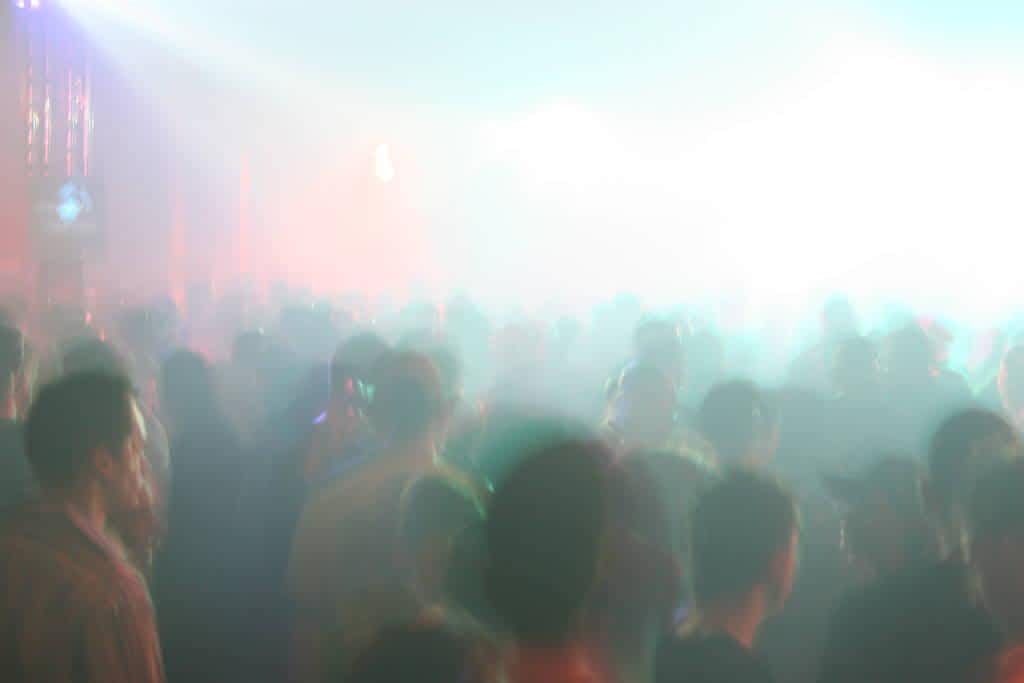
We’ve dealt with the parties and homeless BS so often I started to have a recurring nightmare about squatter’s noisy partying in our yard, and eventually in our house.
In the dream, I was alone, trying to get them out. They would laugh at me, and then carry on.
Loudly.
While I panic.
I haven’t had the nightmare in years, but I never forgot how anxious and violated it made me feel for days afterward, as if dreaming it made it real. That is high anxiety.
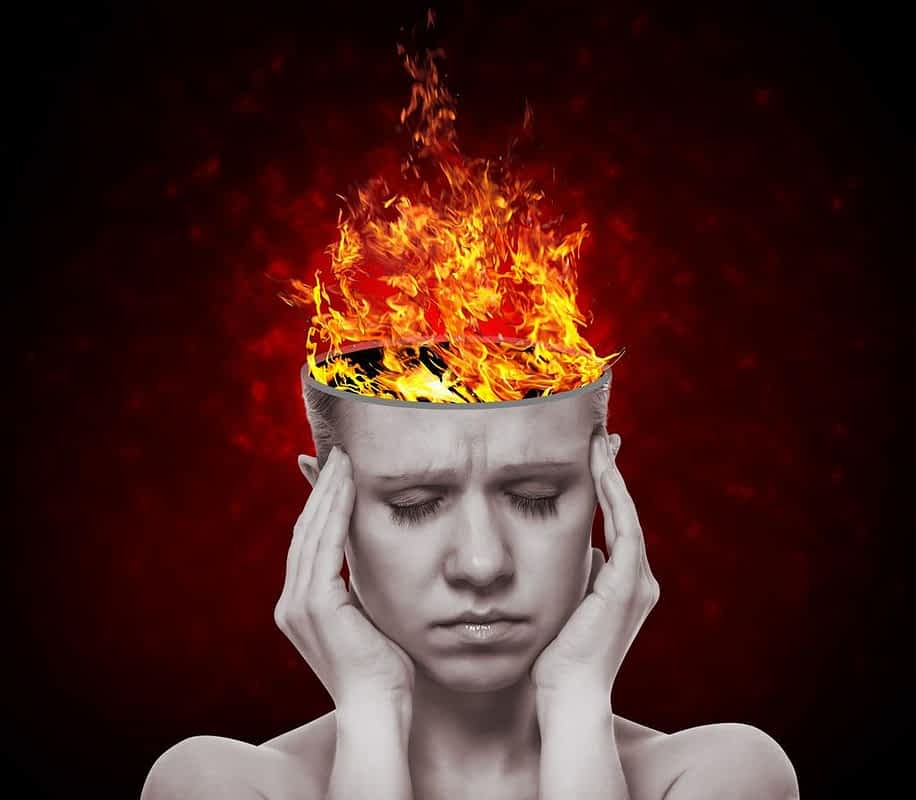
You can imagine my horror, when I saw a huge party bus for a mariachi band parked on the dirt lot just beyond our fence. I came out there, and tried to ask what was going on.
Alongside the party bus was a fire truck, a handmade sign with the word “rodeo” scrawled on it, and an arrow pointing to a property down the dirt road behind our house.
Obviously, this party was going to be a real hell-raiser. (On top of that you can’t just decide one day to have a “rodeo” in your back yard. There were no protections in place for the animals in their little rodeo, either. As a person who has had horses and love them, this didn’t set well with me. That alone was enough to bring the Karen-ing out of me.
This was on a Sunday night, too. It doesn’t matter that the rest of us living in the neighborhood have work on Monday morning??
I called the fireman over to our gate. He was VERY dismissive of me, and my concerns, dodged my questions, and walked away while I was still trying to talk to him.
Since I have had to deal with dismissive attitudes so very much in my decades long marriage, this was all it took to send me over the edge. The Karen-ing intensified at a dizzying speed, and I hated myself for yelling at him because out here, we revere our firemen.
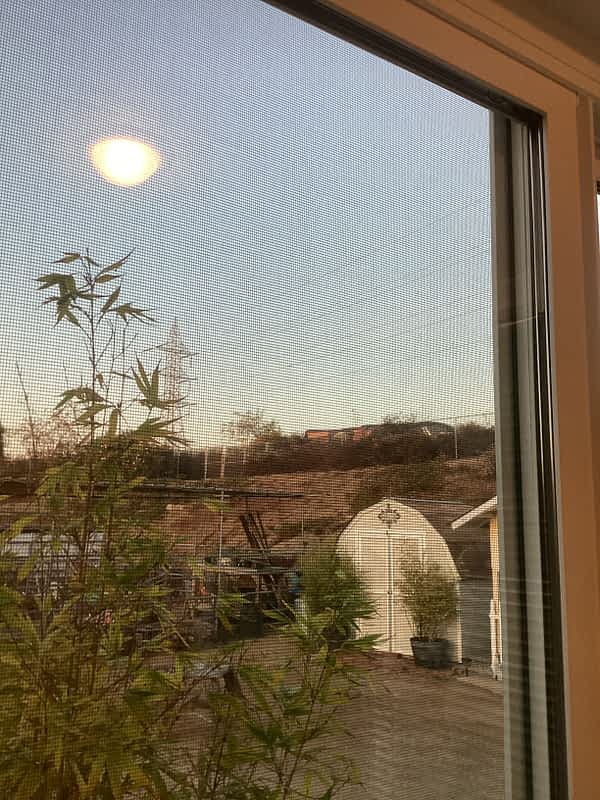
I was livid and in that moment, I didn’t care if he was the Queen of England. I lost my cool with him. It felt like an out of body experience. My temper went from 0-100 because being dismissed is one of my triggers.
I shouldn’t have done it, but if you knew the trouble we’ve had in the past, with noise, speeding, illegal dumping, squatting, theft, and all the other fun stuff that comes with meth-heads, drugs, and the people who use them, you’d understand why I had such an emotional reaction. My kids are having to share the road with the drunks leaving these parties as well since they both work late nights.
🔥Never mind the fact that we are in a very high fire danger area.
We pay a lot of money to enjoy our peace and quiet, and when you get old, and crotchety, like me, you value that peace.
👉You cling to it.
👉You need it.
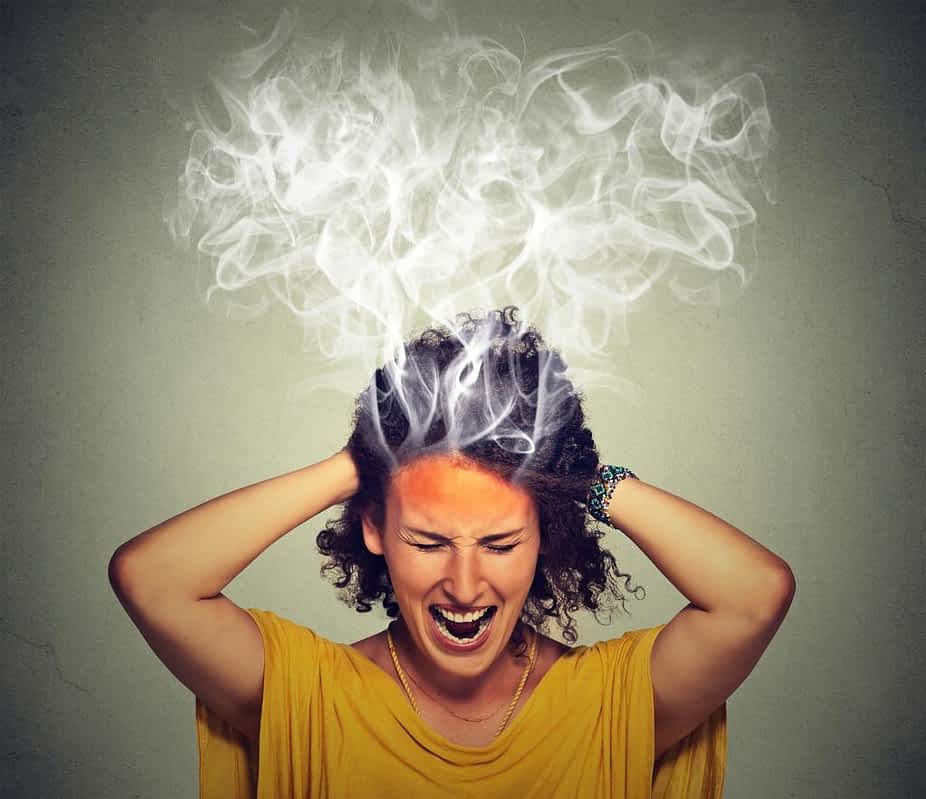
To make it worse, when I came back into the house, my husband and I got into a terrible fight over it. My being emotionally reactive, caused him to respond in kind (he is highly emotionally reactive).
It was a mess, and so very upsetting. It also confirmed in my mind that our relationship is toxic, or we’d have had better, healthier ways of dealing with these kinds of issues.
Of course, since he is ill-equipped at dealing with emotional triggers himself, and even more emotionally reactive than I am, calming down wasn’t happening, and the whole thing just blew up.
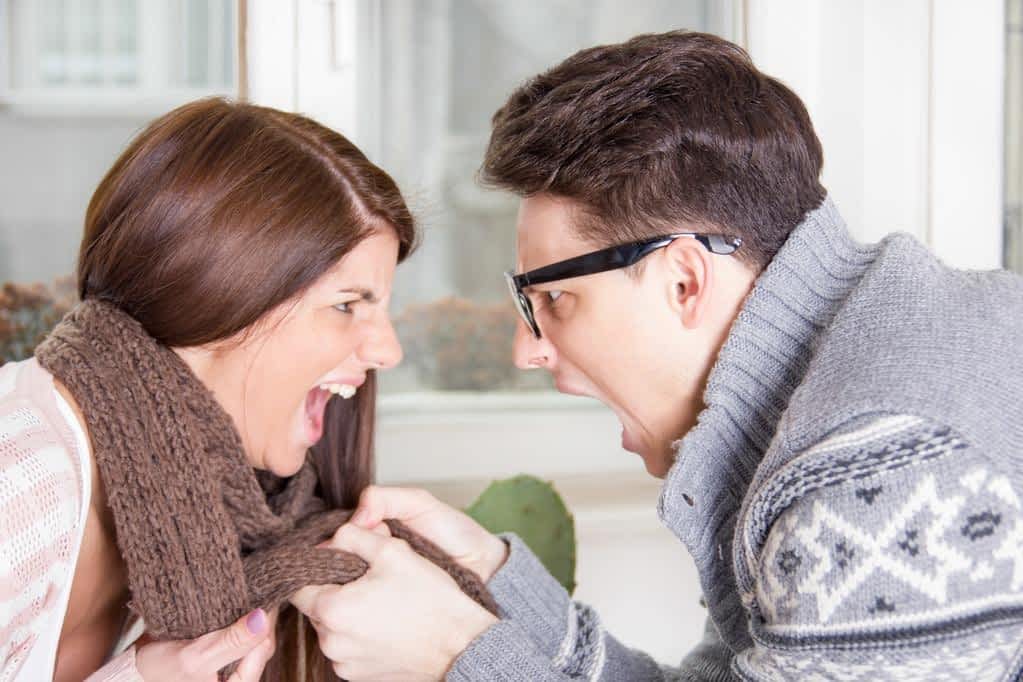
Characteristics of Emotionally Reactive People
Emotionally reactive people aren’t hard to spot, especially if you are one. (Guilty.) They tend to fall into the same patterns over and over, whether it’s in conversations, conflicts, or even just everyday annoyances like someone chewing too loud.
You’ll see the signs in how they think, how they react, and how they communicate (or, let’s be honest, sometimes explode). Once you know what to look for, these patterns are about as subtle as a car alarm at 3 a.m.
Here’s what emotional reactivity tends to look like in real life – the stuff we don’t like to admit.
🚩Quick to Anger or Upset
One of the dead giveaways of an emotionally reactive person is the speed of the switch. One minute, they’re cool as a cucumber. The next, they’re fuming over something that seems small to everyone else, like a missed text or a slightly sarcastic comment.
Minor frustrations or everyday annoyances can feel majorly personal, and the emotional response is usually way bigger than the situation calls for. We’re talking full-blown arguments, raised voices, maybe even tears—over stuff that, later, seems kind of ridiculous. (But in the moment? Oh, it’s war.)
🚩Black-and-White Thinking
Emotionally reactive folks usually aren’t big fans of the gray area. It’s all-or-nothing thinking: you’re either with them or against them, it’s either a perfect day or a total disaster. There’s not much middle ground, and that black-and-white mindset only adds fuel to the fire.
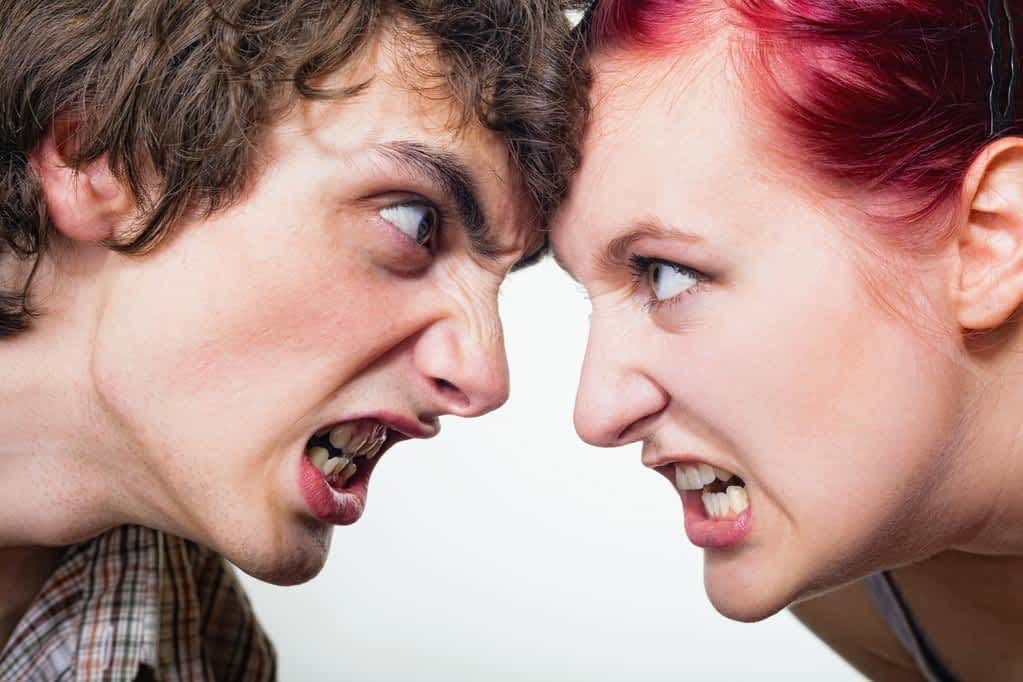
🚩Difficulty Letting Go
Emotionally reactive people don’t just feel things deeply; they hang onto those feelings like it’s their job. A casual comment, a weird look, or a slightly cold text can stick with them for days (or weeks), long after everyone else has moved on and forgotten it ever happened.
🚩Overpersonalization
If there’s one thing emotionally reactive people excel at, it’s taking things personally. Like Olympic-level personal. A harmless joke feels like a jab. A different opinion might as well be a full-blown character assassination.
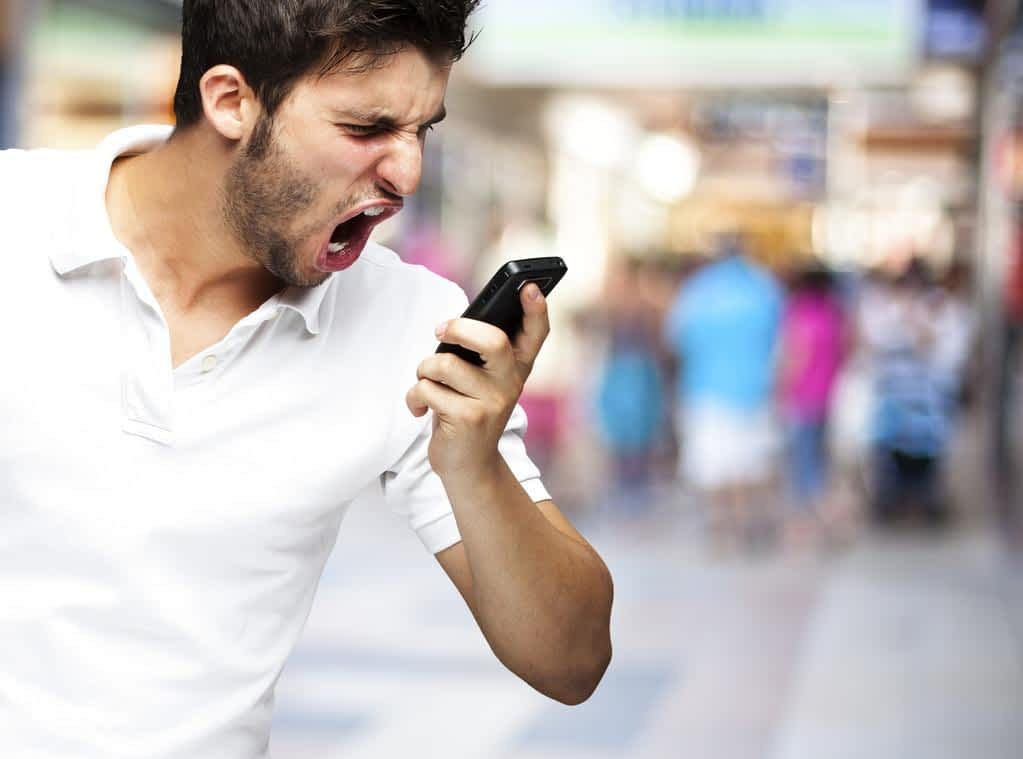
🚩Constant Need for Validation
Emotionally reactive people are often on a low-key scavenger hunt for reassurance. When they’re feeling insecure or triggered, they look outside themselves, partners, friends, even strangers, for some kind of emotional pat on the back.
🚩Impulsive Responses
Pause? What pause? Emotionally reactive people usually skip right over it. Instead of taking a breath or processing what they’re feeling, they jump straight into action, usually the kind that burns bridges.
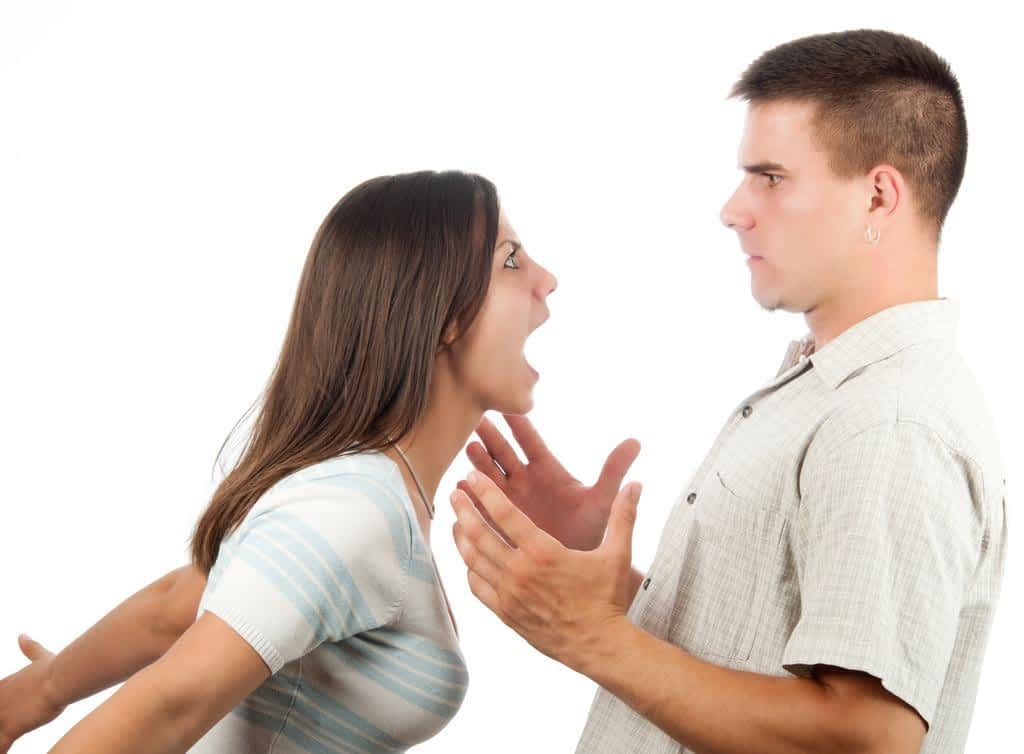
The Root Causes of Why You Can’t Stop Losing Your Cool
If you want to stop being emotionally reactive, you’ve got to understand why it keeps happening in the first place. You’re not just blowing up for no reason; there’s always something deeper feeding that fire. And no, it’s not just “being dramatic.”
There are a handful of common culprits that explain why some people react harder, faster, and louder than others. Getting a handle on those root causes is the first real step to stop emotional reactivity before it takes the wheel.
🔥Early Childhood Experiences
A lot of emotional reactivity doesn’t start in adulthood—it starts way back in childhood. If someone grew up in a home where yelling, slamming doors, or walking on eggshells was just a Tuesday, their nervous system learned to stay on high alert.
🔥Unresolved Trauma
Unresolved trauma is another major fuel source for emotional reactivity. Whether it’s rooted in childhood or came later in life, trauma wires the brain to stay on high alert – always scanning for danger, even when there isn’t any.

🔥Anxiety and Depression
Being emotionally reactive often goes hand-in-hand with mental health struggles like anxiety and depression, as well as having ADHD. People with anxiety tend to feel emotionally overwhelmed faster, while depression can make it harder to control emotional outbursts or bounce back from emotional lows.
🔥Overactive Stress Response
An overactive stress response, often linked to the body’s “fight or flight” mechanism, can make emotional reactivity more intense. When someone perceives a threat—whether emotional, social, or physical—their body reacts by pumping out stress hormones. This flood of cortisol and adrenaline makes it harder to think clearly and regulate emotions, leading to impulsive, reactive behavior.

🔥Lack of Emotional Awareness
Many emotionally reactive people aren’t fully aware of their own emotional triggers. They may react out of habit, without taking the time to understand what’s fueling their emotions. This lack of emotional awareness causes reactivity to feel out of control, as they don’t understand why they’re feeling the way they do.
🔥Fatigue and Burnout
Emotional reactivity is often higher in people who are exhausted, emotionally, physically or mentally. Fatigue reduces your ability to stop losing your cool, making it harder to keep a lid on intense feelings. Whether it’s due to work stress, sleep deprivation, or prolonged emotional strain, burnout makes it harder for these people to control emotional outbursts and less capable of emotional regulation.
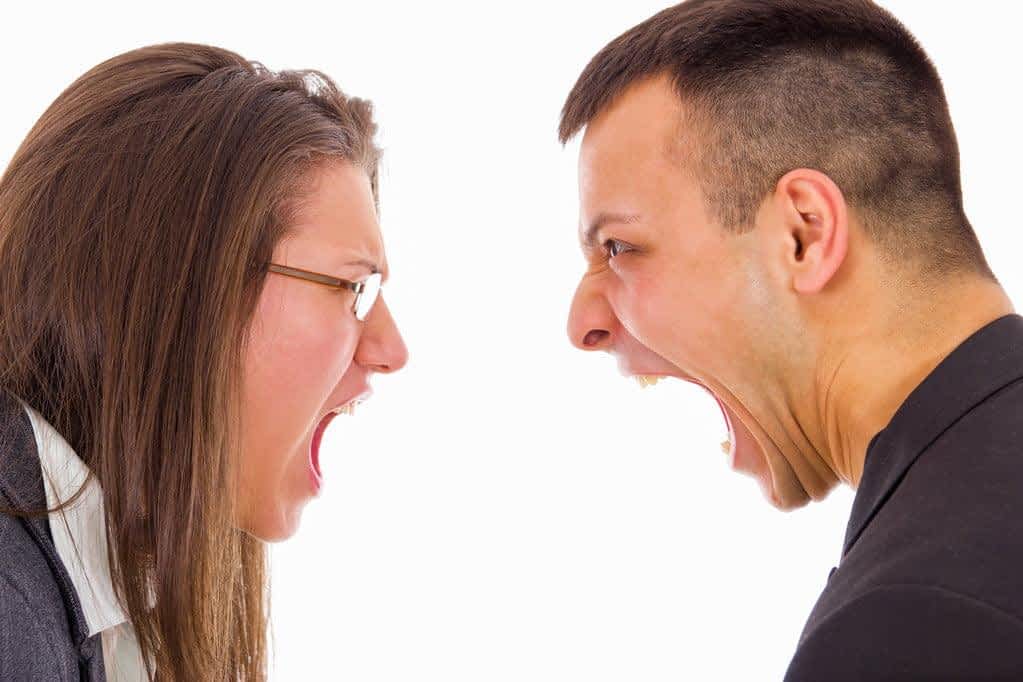
7 Ways to Control Emotional Outbursts
Being emotionally reactive can feel like getting hit by a storm you didn’t see coming. One minute you’re fine, the next you’re caught in a mess of emotional outbursts, miscommunication, and the kind of regret that shows up at 3 a.m. with receipts.
You’ve probably heard all the classic advice on how to stop losing your cool – deep breaths, count to ten, maybe download a meditation app you’ll forget about in a week. And sure, that stuff isn’t wrong… but it barely scratches the surface.
If you’re done with surface-level fixes and ready to actually stop emotional reactivity, here are seven strategies that go deeper and actually help with dealing with emotional triggers, without feeling like a self-help cliché.

✔️1. Understand the Root of Emotional Reactivity
Before you can stop being emotionally reactive, you’ve got to get honest about what’s really going on under the surface. Emotional reactivity often traces back to unresolved stuff from the past, deep-rooted fears, or unmet emotional needs.
The first step to dealing with emotional triggers is figuring out what’s actually triggering you. Think back on those moments when you clearly couldn’t stop losing your cool and ask yourself: what was I really reacting to? The more you recognize your own patterns, the easier it becomes to stop emotional reactivity before it takes over.

✔️2. Develop Your Emotional Vocabulary
One underrated way to stop being emotionally reactive is to learn to say more than just “I’m mad.” Most people have the emotional vocabulary of a potato: happy, sad, angry, repeat. But emotions are way more layered than that, and if you can’t name what you’re feeling, you’ll struggle to manage it.
Here’s the deal: emotional reactivity spikes when your brain’s going “ugh, I feel bad” but can’t figure out why. Being irritated isn’t the same as being resentful. Feeling disappointed hits differently than straight-up frustration. When you get clear on what you’re actually feeling, it’s easier to respond instead of react.
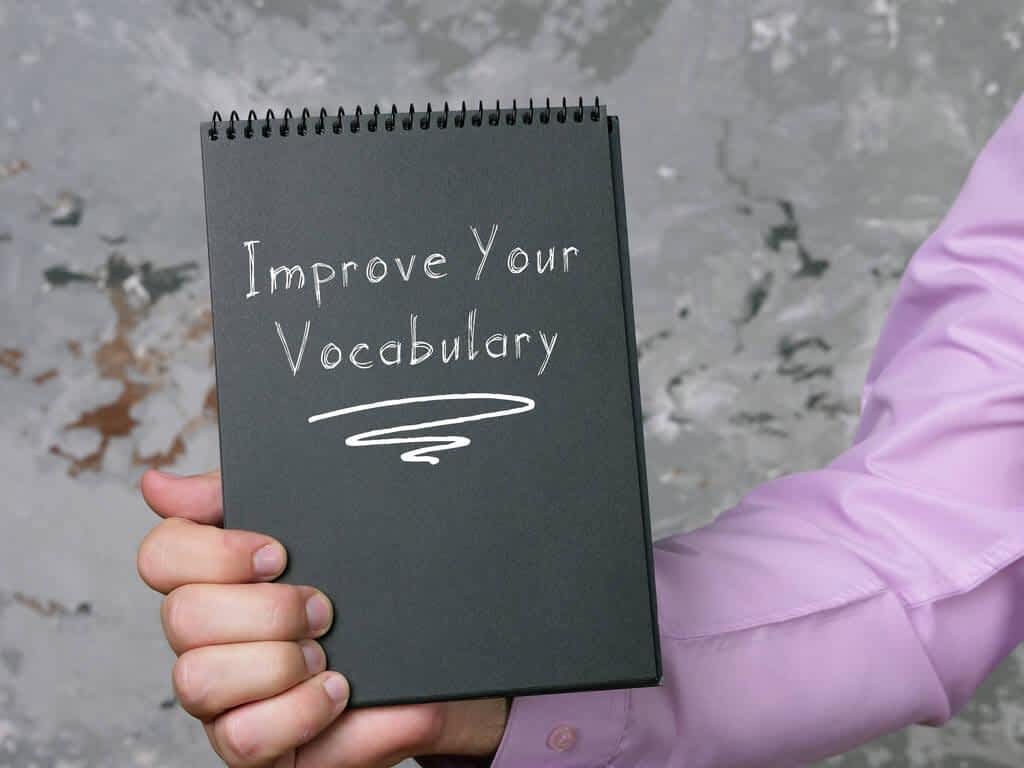
✔️3. Break the Thought-Emotion Spiral
Emotionally reactive people often get stuck in a nasty thought-emotion loop. One negative thought sparks an emotion, which fuels more negative thinking—and before you know it, you’re in full-blown emotional reactivity mode.
Instead of letting that spiral take over, hit pause and challenge those first thoughts. Ask yourself, “Is this really as bad as it feels?” or “Am I reading this right?”
This kind of mental check helps you stop losing your cool before it turns into an outburst or anxiety. It’s all about breaking the cycle and taking back control.

✔️4. Practice “Tactical Grounding”
When emotional reactivity starts bubbling up, deep breaths just won’t cut it. Try “tactical grounding”—something first responders use to keep their cool when chaos hits. Focus on what you can see, hear, smell, taste, or touch. In other words – TOUCH GRASS. This anchors you in the moment and tells your brain, “Relax, you’re safe.”

✔️5. Increase Emotional Tolerance with Micro-Dosing Stress
Want to stop emotional reactivity? Try “micro-dosing” stress. Emotional reactivity spikes because even a little discomfort feels like a full-on crisis. But if you regularly put yourself in mildly stressful spots—like having that awkward convo or sitting with some frustration—you teach your brain to chill out under pressure.
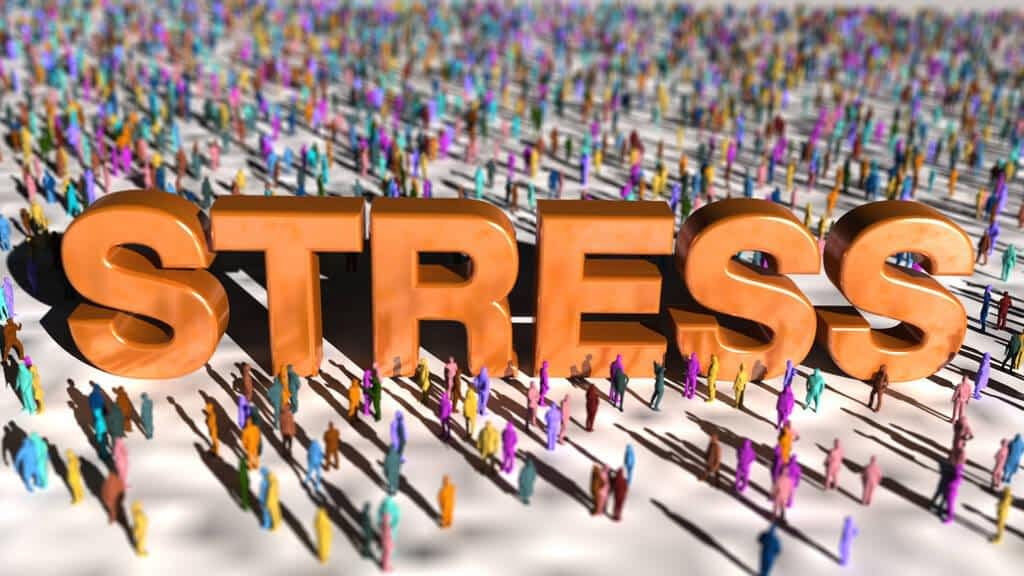
✔️6. Practice “Reflective Listening” in Conversations
Emotionally reactive people often tank communication in relationships. They interrupt, get defensive, or just plain mishear what’s being said. A simple fix is to practice “reflective listening.” Instead of firing back right away, repeat what you heard silently or out loud. This helps you slow down, clear up misunderstandings, and most importantly, stop emotional reactivity before it wrecks the convo.
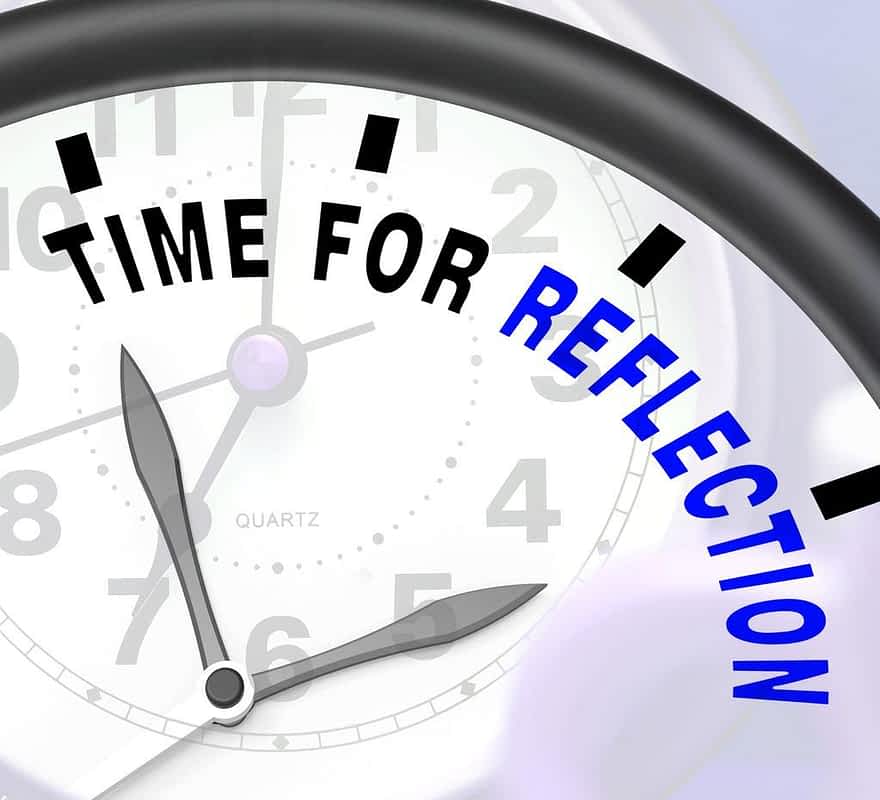
✔️7. Strengthen Your Emotional Muscles with “Emotional Fasting”
Sometimes you just gotta hit pause to stop emotional reactivity. Think of it like emotional fasting; giving your brain a break from all the drama, chaos, and nonstop triggers. Step back from heated talks, social media battles, or even people who keep setting off your emotional alarms. This isn’t running away – it’s smart emotional regulation.
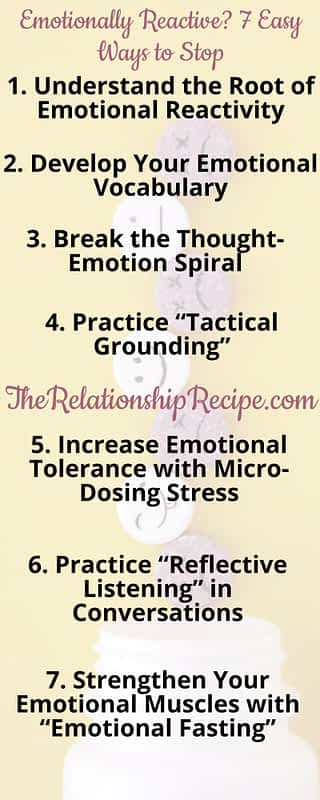
The Mental Impact on Emotionally Reactive People
Emotional reactivity doesn’t just mess with your relationships – it takes a toll on your mental health too. When you’re constantly caught in that loop, anxiety, depression, and feelings of not being enough tend to show up uninvited.
People who are emotionally reactive often feel like they’re losing control, which only cranks up stress and keeps the cycle of emotional disregulation spinning. That’s why practicing ways to stop emotional reactivity, like the strategies we talked about, can seriously help you get your mental health back on track.

Final Thoughts on Dealing With Emotional Triggers
Controlling emotional reactivity isn’t about quick fixes or tired advice. It’s digging into what’s really driving your reactions and using practical, down-to-earth strategies to take back control. By adding these seven fresh ways to stop emotional reactivity into your toolbox, you’ll be way better at handling life’s emotional roller coaster without losing your cool, and with way more calm and clarity.
Thank you for reading this post, don't forget to subscribe!







